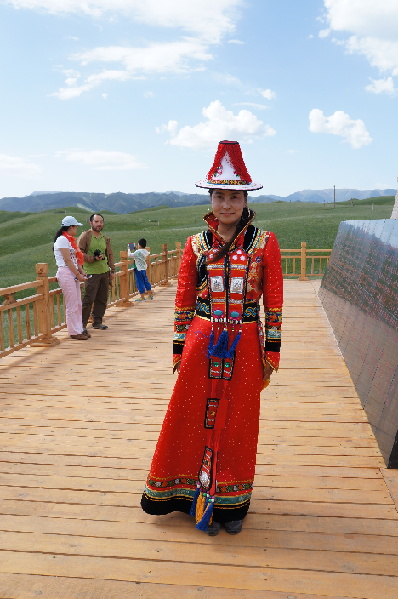Yugur pastures preserve nomadic life
- By Wu Jin
 0 Comment(s)
0 Comment(s) Print
Print E-mail China.org.cn, July 30, 2014
E-mail China.org.cn, July 30, 2014
Saran Jisi, a 28 year-old Yugur minority in northwest China's Gansu Province, returned to her grassland hometown a few years after she graduated from Lanzhou University of Technology.
 |
|
Saran Jisi, a tour guide at the Yugurs Scenic Spot in Sunan Yugur Autonomous County, Gansu Province |
She is now working as a tourist guide on the pasture of the matriarchal Yugur community and is also a herdswoman in her spare time.
With a sparse population of 13,000 people over an 880-square-kilometer area, the Yugurs are a very small ethnic group, but the minority has a strong awareness of its cultural identity, which they are sparing no effort to preserve.
Every Yugur knows exactly how nomadic they are. "An old saying goes, as long as the Yugur people drink, they can drink wine, as long as they speak, they can sing local songs and as long as they walk, they can dance spontaneously," Jisi said. Besides, they practise the Tibetan Buddhist religion and three rituals -- cutting the hair of three-year-old toddlers, Yugur baptisms for children, and wedding ceremonies. The religion and these rituals create a strong sense of belonging.
"About 80 percent of young people are able to enter Yugur universities. Only a few have settled down outside their hometown. Most of them choose to return home after spending a few years elsewhere," Jisi said.
And they come home not only to herd sheep, but also to enter the booming tourist industry, renting tents to visitors, working as tour guides or opening restaurants, thanks to the improved conditions of the pastures.
The Sunan Yugur Autonomous County introduced a temporary grazing prohibition policy in 2005, since which the sheep have been encircled in the fold for a certain number of days each year, so that the grass can grow. This policy saved the Yugurs' pastures from desertification.
Each family in the Yugurs can own no more than 200 sheep and should fence them in their allocated land. And they get about 30,000 yuan (US$4,855) to 50,000 yuan from animals.
"We know the tertiary industry cannot compare with herding (which is more profitable), but the mountains and pastures have never been so green since the policy was launched," Jisi said.
And she is probably right. The improved ecological environment has protected the Yugur people's nomadic life while allowing them to start up other businesses on the pasture.
Tuo Peng, a 31-year-old Yugur man, is an electronic accounting graduate. When he was a child, he had to leave his parents and live with another family next to his school, because his house was very far away and in a poor condition. But now, he is able to afford a house in the center of the county so his son can be close to school. He has made more than 200,000 yuan from the restaurant he opened at Yugur Scenic Spot, almost quadruple what he used to earn. Moreover, he keeps his livestock in the pasture and can lead a herdsman's life whenever he wants to.
"I feel extremely good when I am riding a horse and herding the sheep," Tuo said.
Although the improved pasture has attracted a generation of Yugurs like Jisi and Tuo, Yugurs customs and language face great challenges in the next generation.
According to Tuo, his son is not very interested in horses, herding and the Yugur language, which are the essential components of the ethnic culture.
He would rather play video games than go horse riding, Tuo said. And his son is not the only one who feels this way.
Jisi said the lack of written language has meant that it is difficult to pass down Yugur traditional culture. Despite the ethnic group's focus on education, which has been provided free of charge to each person from the age of 3 to 18, and the policies rewarding those who enter universities with 4,000 yuan to 20,000 yuan, the younger generation of Yugurs speak the Yugur language less often, because it has no standard phonetic symbols.
According to Jisi, people are striving to preserve the language, by learning Turkish phonetic symbols, which is similar in pronunciation and teaching children the language as early as in kindergarten. But they still need more support to preserve the vernacular language.
Chang Jian, professor and deputy director of the Center for the Study of Human Rights said, "We need to protect the language, culture and religion of the minority group, because culture plays a significant role in supporting people's lives."
"Protecting cultural diversity is particularly important in the globalization era, because mono-cultural development obstructs the progress of mankind."





